Around the country, from Los Angeles to Atlanta, Walden grads are leveraging their education and personal experiences to make a difference in their communities. Whether they’re working to close achievement gaps for students of color, opening new horizons of opportunity for children raised in foster care, ensuring students have access to feminine hygiene essentials, or serving courageously on the front lines of the COVID-19 pandemic, these Walden alumni are truly using their education for good.
This series showcases the inspiring and world-changing work of Walden graduates in each of these categories: ADVOCATE, CATALYST, CHANGE AGENT, INNOVATOR, and VISIONARY. We hope their achievements and stories will not only inspire you but also remind you of the power of education to empower the greater good and create social change.
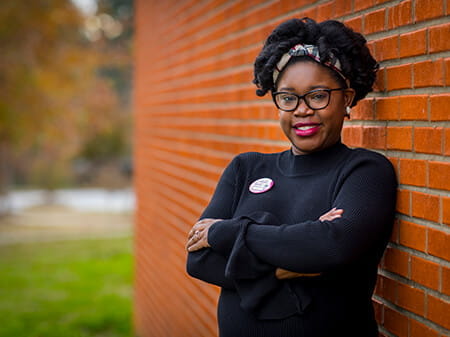
Advocate
The term “period poverty” may be unfamiliar to many. But for Dr. Elesia Glover ’18, PhD in Public Policy and Administration, the issue ignited outrage—and a mission to help girls access the feminine hygiene products they need to stay in school.
“Many women cannot afford the feminine hygiene essentials they need for themselves and their daughters,” Glover explains. For girls in middle and high school, this lack of access often comes at a hefty price: missing class. “School nurses told me they would often run out of these supplies halfway through the year. Then they or teachers use their own funds to try to create a supply. If not, students just call a parent to pick them up or they drive themselves home. I saw it as an obstacle that should not exist.”
To help overcome this obstacle, Glover started Posh Pack, an organization that supplies feminine hygiene products to middle schools and high schools in Georgia and beyond. She wanted to create a way for girls to get what they need without feeling embarrassed. The name “Posh Pack” is discreet enough that young women feel comfortable asking for it in the classroom. It’s a stylish, simple pink and purple bag with two pads inside and a postcard on feminine hygiene health.
Glover grew up in a family of educators—her mother, grandmother, great-grandmother, and all her aunts. She remembers hearing stories of kids who washed their clothes at school or who didn’t have enough food at home. It was these anecdotes that nurtured her deep and lifelong commitment to advocacy.
“One of the things that attracted me to Walden was the social change foundation across all their programs,” she says. “My degree gives me access to conversations I would not have had access to before. It also increased my confidence in what I was capable of.”
The COVID-19 pandemic has brought the issue of period poverty to the forefront, prompting Glover and her team to temporarily expand their mission. “We’ve had to adapt to serve women in general, because we’ve had so many organizations reach out and ask us for help. We just gave more than 1,200 pads to a mental health institute for women in Georgia.”
Glover says when the pandemic subsides, they will refocus on students. She looks forward to continuing to expand Posh Pack across different states. “I think about the girl who already has a lot going on, who wants to be successful, but feels like all odds are against her,” she says. “If I can take one thing off of her plate, I’m more than happy to do that.”
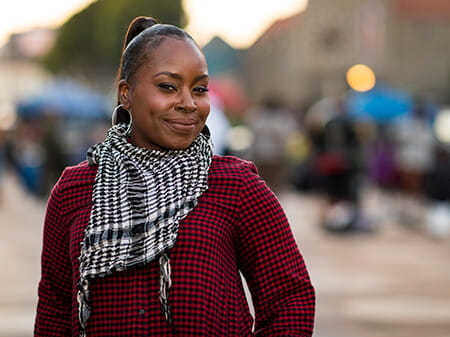
Catalyst for Good
Born into the foster care system and adopted at age 3 by a single mother who later passed away, Dr. Kay Ramsey ’17, PhD in Public Policy Administration, understands the potentially devastating effects of an unstable youth.
For the foster care population, ages 16 to 24, Ramsey explains, there is a significant increase in high school dropout rates and low matriculation into college. “So I wanted to be able to, for myself, shatter a lot of those stereotypes and say, ‘Yes, I was born into foster care. Yes, these things happened to me, but I will not let that be my destiny. I will not become a statistic,’” she says.
In her early 20s, after the death of her adoptive mother, Ramsey experienced homelessness until the supervisor at her new job paid her first month’s rent. She went on to earn a bachelor’s degree, joining the mere 2.5% of foster care youth who graduate from a four-year college. This eventually turned into a double master’s degree.
Ramsey attributes her resilience and perseverance to having strong mentors—such as Joe Rouzan, a retired police officer who is now the executive director of a nonprofit. “I saw him from afar, and he really had it together,” she says. “Joe has been a lifetime mentor for me, 15 years plus, and I know I can always call on him for guidance and support.”
Her higher education journey eventually led her to Walden. Graduating with her doctorate in 2017, Ramsey is now executive branch director for Bethany Christian Services of Southern California, which seeks to protect children, empower youth, and strengthen families through quality social services.
Being a multidimensional change agent is about more than offering physical resources; it’s about offering hope, too. Today, through Bethany’s partnerships with various organizations, Ramsey provides support and mentorship to a full scope of marginalized populations. This includes children cycling through foster care, as well as fathers returning home from prison, domestic violence survivors, and, more recently, refugees and immigrants who have endured extraordinary trauma.
For Ramsey, it all boils down to being a role model for others, like her mentors were for her. “We need inspirational people,” she says. “My Walden dissertation was about, ‘How often do we need to be inspired?’ We need it every day, and not just if you’re in foster care. Just as humans, we need to be inspired every single day. That’s what it means to shatter and disqualify stereotypes.”
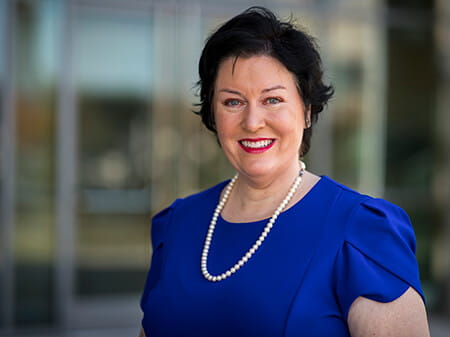
Change Agent
“I wouldn’t be where I am today without Walden,” says Dr. Reagan Romali ’11, PhD in Education. “In every class, there was an agenda of equitizing outcomes and understanding social justice. It was expected that we as students would become leaders who would then go out into the world and implement social change.”
As a nationally recognized community college leader, Romali measures social change in the number of diplomas she hands to students on graduation day. From Chicago to Los Angeles, she has dedicated her career to broadening access to higher education in poverty-stricken neighborhoods and closing achievement gaps for people of color.
“When you work in inner cities, you see stories every single day—stories related to hunger or homelessness,” she says. “You see what people go through due to the lack of something—whether it be food, safety, home, family—and it cuts you to your core. You want to spend your entire career trying to make it better for them.”
And that’s exactly what she’s done. Over the past several years, Romali and the colleges she’s led have implemented a number of strategies to help ensure everyone achieves at the same rate. This has boosted graduation rates—and not by a modest amount. At one Chicago college where she served as president for six years, graduation rates tripled.
At a college in Long Beach, where she was superintendent-president for three years, the success was particularly notable. In 2017/2018, the degree attainment rate increased by 27% overall, with a 21% increase for Latinos, 41% for Pacific Islanders, and 25% for African Americans. “Then, in 2018/2019, we increased graduation 29% with similar numbers for populations of color,” she explains. “That made [the college] the most improved in the state for [degree] attainment.”
Today, as the interim vice president of administrative services at a college in Los Angeles, Romali is part of a visionary leadership team navigating new complexities amid the COVID-19 pandemic. They’ve provided students with laptops, Wi-Fi, food pantry access, and grocery gift cards. “Being able to get food and technology into the hands of students has been critical. Every day, we think: ‘OK, what else can we do?’” she says.
“I know I’m an idealist, but I think we can heal a lot of what ails our society through education,” Romali explains. “When someone has that piece of paper in their hand, I see it as a golden ticket to a better future. And if my work had even the tiniest impact on that, I’ve done what I need to do in life.”
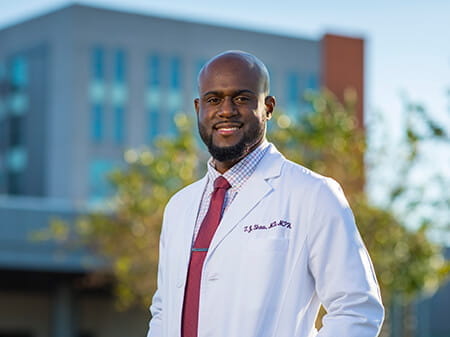
Innovator
“The most powerful gateway drug isn’t marijuana—it’s tragedy,” says Dr. Jamar Shaw ’18, Master of Public Health (MPH). “We find that depression and addiction walk hand in hand.”
Shaw was inspired to enter the mental health field after watching his grandmother care for his uncle, who struggled with addiction most of his life after watching his brother drown.
“In that moment, my uncle’s entire world changed,” Shaw remembers. “He searched for something to numb the pain. And that’s what led him into addiction. While other family members were fed up and frustrated, I marveled at my grandma’s ability to have compassion for him. And it was really her persistence and love that led my uncle into sobriety.”
Shaw, who recently joined Emory Healthcare, previously served as director of medical affairs for the Central Florida Recovery Center. In that role, he applied what he learned to help diverse populations overcome addiction and mental health challenges. The clinic practices a nontraditional technique called psychosocial rehabilitation. “We believe if you can somehow help the root cause of the anxiety or depression that’s causing the addiction, it’s better than just treating the addiction itself with medication,” Shaw explains. “This has been very effective for us.”
Shaw says that the clinic aims to help patients become clean and sober in their own environments. “Our rehabilitators look at the house, where they live, and their family life structure. These are all things that play a role in their recovery. And we tailor their recovery plan based on these factors. We find that through this method, most of our patients move on to productive, amazing lives and sobriety.”
One of the challenges Shaw has encountered along the way is the stigma around depression, especially in the Black community. “I can speak for myself—there’s a big stigma with mental health, especially for Black males,” he says. “The mindset is, ‘You should just get over it, and you don’t need treatment.’” Shaw hopes that through the clinic’s outreach work in central Florida communities, those who are struggling gain the confidence and courage to seek out the treatment they require.
Shaw has another unique platform for banishing the shame and secrecy surrounding mental health: poetry. As a champion spoken word poet, he’s able to connect with communities across the globe, both online and offline. “Through poetry, I try to challenge dominant narratives related to health and race, bring awareness to health inequalities, and scrutinize the stigma of mental health,” he says. “It’s difficult, but rewarding. Even if you can help one patient or save one life, then it’s worth it.”
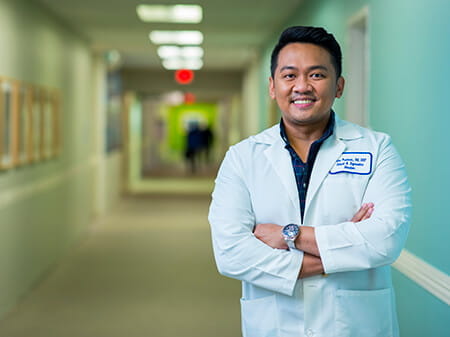
Visionaries
After earning his Doctor of Nursing Practice (DNP) in 2019, Dr. Denise Angelo Prudencio flew west to join Sacramento’s medical system as a nurse educator. Little did he know he’d soon be guiding staff through one of the biggest health crises this country has ever faced.
“The first few months of the pandemic, we were so busy,” he explains. “Even now, our ICU beds are fully occupied and our COVID-19 unit is full, too.”
A consummate coach, Prudencio is adapting daily to best support his frontline nurses. He says that mentoring, a role he’s passionate about, plays a big part in helping his nurses stay healthy and resilient during a global pandemic.
Prudencio credits his effectiveness as an educator to his personal experiences. Born and raised in Manila, Philippines, he traveled to the U.S. in 2009 to further his education. He remembers the critical role his peer relationships played in helping him find his footing in a new country and culture.
When he started his DNP program at Walden in 2015, he found similar support. “Online education was new for me,” he explains. “So I thought, ‘How will I make it, especially when English is my second language?’ But my Walden DNP mentor, Dr. Linda Matheson, really made time for me. We scheduled one-on-ones just to make sure I had everything I needed throughout the process. I remember when she told me, ‘Oh, I can call you Dr. Prudencio now.’ And I said, ‘Oh, my goodness.’”
Today, Prudencio supports his own mentees by building rapport on a personal as well as a professional level. “If my nurses are stressed about work or about their personal life, I want them to know I’m here to be their shoulder to cry on or just to vent. Sometimes that’s the best way to prevent burnout, if you have somebody that you can lean on … someone you can trust to communicate your need. This is how we can help prevent that messy situation down the road.”
Baltimore magazine honored Prudencio in its 2019 Excellence in Nursing awards for his contributions as a nurse educator. And for now, it’s a role he embraces. “My goal ultimately is to move into leadership. But right now, I want to continue doing what I’m doing.”
What’s the best part about coaching other nurses? Prudencio says it’s watching someone else tap into their talent and potential. “When they learn or attain something after you’ve mentored them, you feel it’s your achievement, too. I think that’s where I find the most meaning.”



